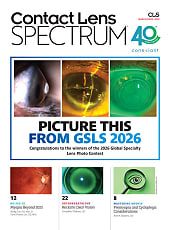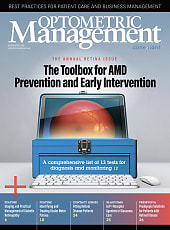Sandra S. Block, OD, M Ed, MPH, FAAO, FCOVD, a professor emeritus at Illinois College of Optometry and past global clinical advisor to the Special Olympics Lions Clubs International Opening Eyes program, was recently elected president of the World Council of Optometry (WCO). During last month’s American Academy of Optometry meeting in New Orleans, Dr. Block sat down with Optometric Management to discuss the WCO, a few of its recent initiatives, and how to become involved in the organization.

Can you provide some background on the WCO?
The World Council of Optometry (WCO) has been around for almost 100 years. Our mission is to facilitate the development of optometry around the world and support optometrists in promoting eye health and vision care as a human right through advocacy, education, policy development, and humanitarian efforts. Our purpose is to represent optometry on the global level and to help optometry grow on the ground.
We are a small group. We are housed at the St. Louis office of the American Optometric Association (AOA) and have three full-time staff. AOA has been gracious to offer us the space as an in-kind donation. Our board of directors is designed to have a representative from each region of the world.
How, specifically, has the WCO represented optometry globally?
The World Health Organization (WHO) released the “World report on vision” in 2019 with the WCO having input in its development. (See bit.ly/WHOvisionreport .) The report highlighted vision and eye health conditions leading to visual impairment very differently than previous reports and forced us to think about things differently. For example, in addition to visual impairment that was documented in publications, the report talked about a billion people who had preventable visual impairment that had never even been addressed, the pandemic of myopia development, and issues related to human resources. And it prompted important questions: Do we have enough optometrists? How do we increase access to care?
Being an optometric organization with an official relationship with WHO has helped to ensure optometry is represented on a global level.
What initiatives has the WCO been involved in recently?
About three years ago, we began to focus on the standard of care for myopia. We can no longer look at myopia as simply an optical problem. It is a disease entity.
The WCO standard of care for myopia is comprised of three main components: mitigation, measurement, and management. Efforts to address the problem are supported by a partnership with CooperVision. Also, we invited experts in the field to participate in addressing how to best address myopia because we want to change the way clinicians practice. Along with the standard, we created two webinar series on myopia.
Also, we have a pledge that we want people to take: “I agree with the standard of care.” We’re up to 56,000 pledges and want to get to 100,000. And in the next four to six months, we plan to launch a myopia tool that can identify risk factors, what to measure, how often to see the patient, when to intervene, and potential interventions.
In the area of dry eye disease, the WCO, in partnership with Alcon, has worked with three key opinion leaders — Professors James Wolffsohn, Jennifer Craig, and Lyndon Jones — to launch the “WCO Alcon Dry Eye Wheel” earlier this year. This is a live, interactive tool that allows clinicians to look at the mitigation, measurement, and management of dry eye disease immediately to help them while a patient is in their office.
This tool is available on the WCO website. Also, we created a series of four webinars to help clinicians understand the thought process in utilizing this tool. For both myopia and dry eye disease, all the webinars are available on our website.
How can people become involved in the WCO?
People can become members officially by paying a small fee. Non-profits don’t have a lot of money, so we also welcome donations.
We look to members to guide us. We want to share information. That’s why our newsletter and all the tools on our website are available to anybody — you don’t have to be a member. All you have to do is visit our website, worldcouncilofoptometry.info . OM



